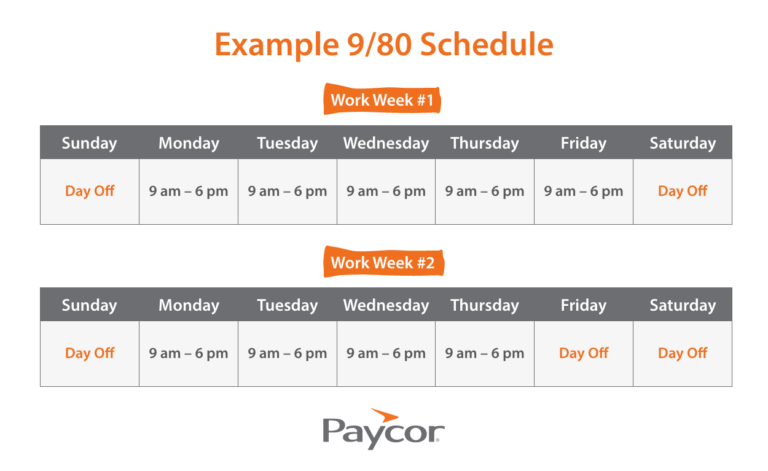How do you balance job satisfaction with productivity? If you work in HR, you know that one leads to the other. And when you put them together, you get retention, financial gains, and long-term business success.
Companies are always looking for new ways to achieve both these goals at the same time. A compressed workweek, like the 9/80 work schedule, is the latest trend. In this article, we’ll explore how this schedule works: the pros, the cons, and the implications for HR.
What is a 9/80 Work Schedule?
In a 9/80 work schedule, employees work 80 hours over nine days, so they get a total of five days off in any two-week period. For example, a person could organize their time like this:

Of course, this is just one example of an alternative work schedule. Your employees could take an extra Monday off instead of a Friday, or their schedules could even change over time. If your company is entirely hybrid or onsite, HR may have to balance different workers’ schedules to ensure staff are always available during business hours.
Benefits of a 9/80 Workweek
Compared to the typical 40-hour workweek, this is a much more flexible work schedule. That flexibility can:
- Enhance employee satisfaction and work/life balance. The 9/80 schedule lets employees spend more time with family, enjoying a three-day weekend every other week. They can use the weekday to run time-sensitive errands, make doctor’s appointments, and handle other tasks that normally take time away from work. Reducing absenteeism boosts their engagement and your company’s bottom line.
- Increase productivity. Studies show that a four-day workweek improves productivity and mental health (World Economic Forum). With more time outside of work, employees can focus on the task at hand more easily.
- Improve recruiting and retention. In today’s job market, a 9/80 work schedule can help you stand out from other employers. The clear work/life balance benefits may attract high performers, demonstrating you care about their well-being more than your competitors.
Challenges of a 9/80 Work Schedule
While alternative work schedules have many benefits, they also have some drawbacks, like:
- Longer workdays: For some employees, extended nine-hour workdays can make it hard to focus. It’s always important to set clear goals and track your progress; that’s doubly true when you first implement a 9/80 work schedule. If people on your team fall behind on longer days, work with them to identify solutions.
- Compliance issues: In some industries, workers can only work a certain number of hours per day or a certain number of days per week. Some employees may even accrue overtime by working a 9/80 schedule. Consult with your legal and finance teams to address these issues before you make any major changes.
- Communication challenges: The 9/80 schedule can make it hard for teams to collaborate. That’s especially true when your employees work with vendors or partners at other companies, but it can also be an internal problem. Strong project management can help you work through most of these issues.
Is the 9/80 Work Schedule Right for Your Business?
There are several things to consider before you implement a 9/80 work schedule. Major scheduling changes impact your company culture, retention rates, productivity, and more. Leaders should approach this decision with care.
Start by conducting research. Survey your employees to gauge their interest in a compressed workweek and analyze their responses. Ask about their concerns, take suggestions, and analyze your findings. If it’s a divisive issue, you might look for a way to give some employees a compressed schedule, while letting others keep their regular hours. HR should lead this process but work closely with the C-suite and middle managers.
If you decide to implement a pilot program, it’s essential to monitor the impact. Set SMART goals and measure progress over time. Schedule check-ins with employees on the 9/80 schedule, as well as their managers and direct reports. Inform everyone of the criteria for ending or continuing the program, so they know what to expect from the process.
How Paycor Helps
Paycor’s suite of HR software is purpose-built for leaders to empower their teams, no matter what times of day they come to work. Scheduling software streamlines communication, keeping you and your employees on the same page. You can also use Paycor Pulse Surveys to track engagement and identify potential challenges.










